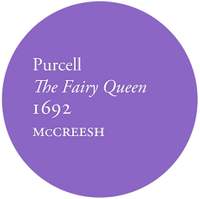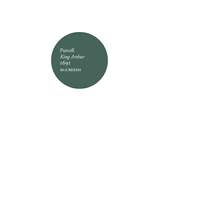Recording of the Week,
Purcell's Fairy Queen from Paul McCreesh and Gabrieli
Paul McCreesh and Gabrieli come bounding back this week with a second Purcell semi-opera – following their new edition of King Arthur, they now turn to The Fairy Queen, once again going back to the source with a new performance version prepared by Christopher Suckling. Purcell’s loose adaptation of Shakespeare’s A Midsummer Night’s Dream, which in my opinion is the most colourful of all his musical stage works, has a knowing charm verging on high camp at times, while shamelessly playing for crude laughs at others.
 Shakespeare’s main characters – Oberon, Titania, the rude mechanicals and so forth – are of course present in the play itself, but as is the way with Purcell’s works of this kind, they aren’t assigned sung roles in the musical masques (I remember first encountering King Arthur and being bewildered that neither the king nor his trusty wizard adviser were anywhere to be seen!). Instead, a cast of fairies, peasants, deities and personifications comments and expands on the action.
Shakespeare’s main characters – Oberon, Titania, the rude mechanicals and so forth – are of course present in the play itself, but as is the way with Purcell’s works of this kind, they aren’t assigned sung roles in the musical masques (I remember first encountering King Arthur and being bewildered that neither the king nor his trusty wizard adviser were anywhere to be seen!). Instead, a cast of fairies, peasants, deities and personifications comments and expands on the action.
From the outset, it’s clear that The Fairy Queen is not a work that takes itself too seriously. The early appearance of a stammering drunken poet – a magnificently over-the-top Ashley Riches, evidently on a roll from his star turn as the inebriated yokel Comus in King Arthur – being pinched and poked by spiteful fairies establishes a comic tone that, even in more serious moments, is never too far away.
Though the singers inevitably enjoy the majority of the limelight, the instrumentalists aren’t overlooked, with much characterful musical imagery in which they too can shine. A “symphony in imitation of birds”, with recorders twittering merrily away, is followed shortly by an “echo” number recalling Dido and Aeneas’s sorcerous adversaries cooking up their subterranean mischief. Later on, the arrival of Phoebus bringing the sunrise is announced by a brief but intense blaze of glory from the trumpets and drums.
It is, of course, not all merrymaking and hurrahs; much of the second act is devoted to the soft fall of night over Titania, with some moments of sublime stillness. “See, even Night Herself is here”, sung bewitchingly by Carolyn Sampson, is a particular highlight. Sampson indeed reprises this mood at the end of the fourth act in the plaintive “O let me weep”, accompanied by a suitably pleading oboe obbligato.
On balance, though, it’s the male soloists who have the most fun in The Fairy Queen; Jeremy Budd’s unmistakeably nimble, high-lying voice is supremely effective in a number of semi-serious airs musing wryly on the nature of Love, and Ashley Riches returns to his rustic style for a dialogue between an overly-amorous peasant and his would-be love (taken by a tenor here – thought perhaps to imply a comic moment of gender confusion in the original play). Lively and entertaining as this is, I wonder if Riches might at this point be a victim of his own success, and be in danger of being typecast as a cider-addled farmer’s lad…
Naturally, despite all the battling of the sexes, the squabbles of Oberon and Titania and the lovelorn sighing, a happy conclusion is as inevitable as day following night. The titular Queen and her King are reconciled in a final scene set, inexplicably, in a Chinese garden, with interjections from characters listed as “Chinese” in the libretto. I was half-expecting some musical exoticism here, but there’s no hint of such flavouring (though such titles as “Dance for the Monkeys” certainly suggest a sumptuously “foreign” visual feast for the theatregoers!). Rather, we close with an entirely English scene of general rejoicing. Greek deities continue to materialise among the pagodas, monkeys and other implied exotic paraphernalia to offer their various blessings on proceedings, which conclude with a triumphant chorus and dance.
Paul McCreesh and Gabrieli have become so accomplished at breathing new life into historical works and occasions that it’s difficult to give this latest recording the praise it deserves without becoming repetitive. Their trademark approach to authenticity continues to be a winning formula – recapturing the spirit, rather than the precise letter, of the original – and the performers all flit effortlessly between the narrative’s changes of mood. I can’t think of anyone who could give a better rendition of this Restoration “feel-good” masterpiece.
Carolyn Sampson (soprano), Anna Dennis (soprano), Mhairi Lawson (soprano), Ashley Riches (bass-baritone), Roderick Williams (baritone), Gabrieli, Paul McCreesh
Available Formats: 2 CDs, MP3, FLAC, Hi-Res FLAC, Hi-Res+ FLAC
Anna Dennis, Mhairi Lawson, Rowan Pierce, Carolyn Sampson (sopranos), Jeremy Budd (high tenor), James Way (tenor), Roderick Williams (baritone), Ashley Riches (bass-baritone), Gabrieli Players, Paul McCreesh
Available Formats: 2 CDs, MP3, FLAC, Hi-Res FLAC, Hi-Res+ FLAC




